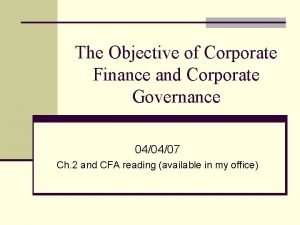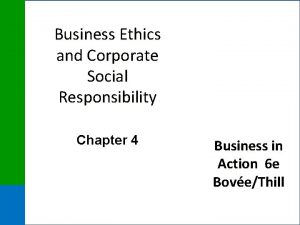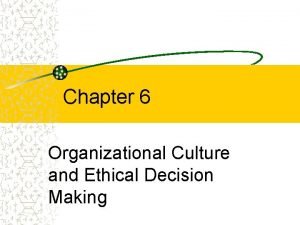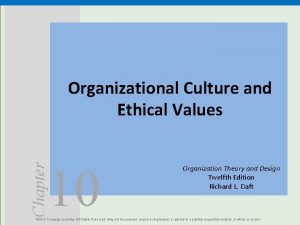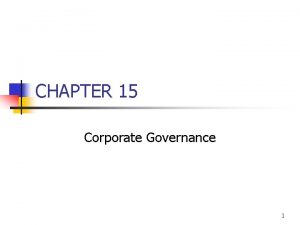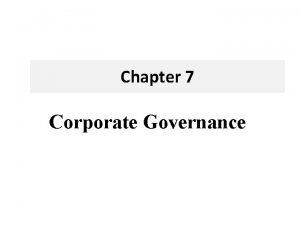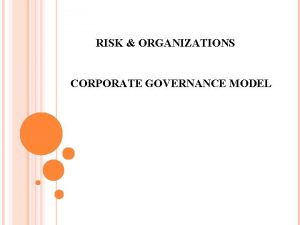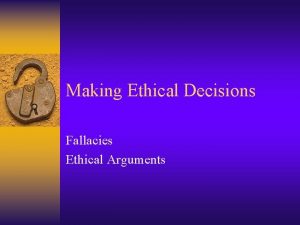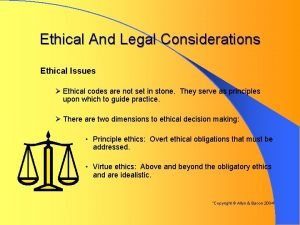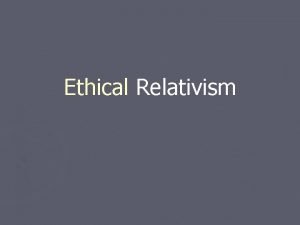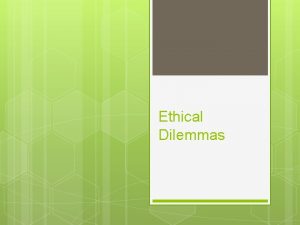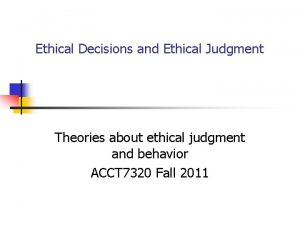Corporate Governance Ethical Thoughts Corporate governance is concerned















- Slides: 15

Corporate Governance

Ethical Thoughts • Corporate governance is concerned with holding the balance between economic and social goals and between individual and communal goals. • The corporate governance framework is there to encourage the efficient use of resources and equally to require accountability for the stewardship of those resources. The aim is to align as nearly as possible the interests of individuals, corporations, and society.

Corporate Governance • The system that is used by firms to control and direct their operations and the operations of their representatives, the employees. • Through the corporate governance structure, firms can ensure that the needs of all stakeholders are satisfied. • Provides a means to measure and validate the ethical vision.

Corporate Governance • The corporate governance system: – Incorporates the objectives of the stakeholders – Ensures that the behavior of the employees within the firm is fair, just, and transparent

Board of Directors • Designed to represent the interests of the stockholders • Agency theory – based on the belief that managers are ‘agents’ of the stockholders because they should be making decisions to benefit the stockholders • The board is a corporate governance mechanism to help ensure that the agents do their job of maximizing returns

Classifications • Inside Board Member: person who has direct financial ties to the firm – Management team • Outside Board Member: person who has not direct financial ties to the firm. – President of a University

Responsibilities for Board Members • Establishing an maintaining internal financial controls • Communicating financial situations internally and externally • Establishing and revising the company’s code of ethics and ethical standards • Selecting the external auditor • Establishing different board committees

Core Values to Guide board Members’ Behavior • Honesty • Integrity • Loyalty • Responsibility • Fairness • Citizenship • Note: Stakeholders must be proactive

Typical Decisions Made by Board Members • Remember that every board of directors is as unique as the firm it represents • Major Decisions: – The annual business plan of the firm – The hiring and compensation of the board members and other officials of the firm – The investments in capital structure and level of firm indebtedness – The issuance of dividends

Typical Decisions Made by Board Members – Discussions pertaining to risk management and insurance policies – Fines and penalties greater than a stated amount – Restructuring of the firm that may exceed a particular amount – Tax settlements that are greater than a certain amount – Contingent liabilities issues greater than a particular amount – Pension contributions that exceed a stated amount

Benefits of A Strong Board of Directors • Having good corporate governance supports not only the ethical requirements established by the stakeholders, but also the financial requirements established by the shareholders

Corporate Compliance Systems and Global Corruption • Corruption: the conscious abuse of public roles and resources for the private benefit of a firm and/or the individuals of the firm; the use of bribery, extortion and/or embezzlement for the benefit of one’s own interests – Bribery: giving a financial benefit in return for influencing the decision of a person in a position of trust – Extortion: the use of intimidation or power in return for financial benefit – Embezzlement: the taking of money illegally from a firm or other source

Corruption • Petty Corruption: occurs when private individuals give illegal financial incentives to non-elected public officials in exchange for favorable dealings with certain government transactions • Grand Corruption: occurs when illegal financial incentives are given to higher ranked public officials • Influence Peddling: occurs when illegal transactions take place along with legal transactions

US Foreign Corrupt Practices Act • Passed into law in 1977 and amended in 1988 • Prohibits any US firm and its foreign subsidiaries from giving foreign government officials any financial incentives in exchange for either obtaining or retaining any government business in that country

Corporate Governance and Stakeholders • Employees, suppliers, and communities want and expect an honest and transparent relationship with the firm • Stockholders expect the firm to perform at the maximum financial performance level
 Objectives of corporate finance
Objectives of corporate finance My thoughts are higher than your thoughts
My thoughts are higher than your thoughts The perceived relevance or importance of an ethical issue
The perceived relevance or importance of an ethical issue Perbedaan ethical dilemma dan ethical lapse
Perbedaan ethical dilemma dan ethical lapse Army ethical reasoning model
Army ethical reasoning model Chapter 4 ethics and social responsibility
Chapter 4 ethics and social responsibility Organizational culture and ethical decision making
Organizational culture and ethical decision making Ethical corporate culture
Ethical corporate culture Organizational culture aspects
Organizational culture aspects Good governance and corporate social responsibility
Good governance and corporate social responsibility Potential problems in corporate governance
Potential problems in corporate governance Meaning of corporate governance
Meaning of corporate governance Makalah etika bisnis dan konsep good corporate governance
Makalah etika bisnis dan konsep good corporate governance Corporate governance strategic management
Corporate governance strategic management Oecd corporate governance principles
Oecd corporate governance principles Role of corporate governance in strategy formulation
Role of corporate governance in strategy formulation
